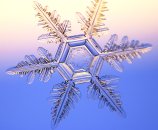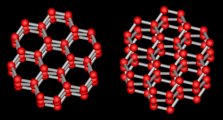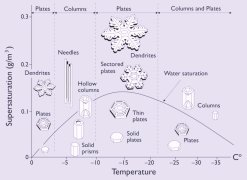| rainbow |
Snowflakes and snow crystals are made of ice, nothing more. A snow crystal, as the name implies, is a single crystal of ice. A snowflake is a more general term, which can mean an individual snow crystal, a few snow crystals stuck together, all the way up to the large "puff-balls" of agglomorated snow crystals that often fall in warmer weather. What exactly is an ice crystal?
A crystal is a material for which the molecules inside are all lined up in a specific way called the crystal lattice. The water molecules in ice form a hexagonal lattice as shown at right (two views of the same thing). Each red ball represents an oxygen atom, and the grey sticks represent hydrogen atoms. There are two hydrogens for each oxygen, making the usual H2O What do simple snow crystals look like?
The most basic
form of a snow crystal is a hexagonal prism, such as that shown at right.
This form occurs because certain surfaces of the crystal, the growth facets,
grow very slowly. Under what conditions do the different snow crystal types form?
This is a key
point for understanding snow crystals. By growing snow crystals in
the laboratory under controlled conditions, one finds that snow crystals
grow in different forms depending on the temperature and humidity in which
the crystal grows. This behavior is summarized in a "morphology
diagram," which gives the crystal shape under different conditions. |
| snowflake |



